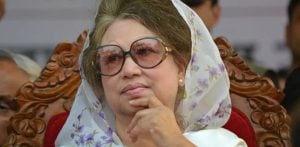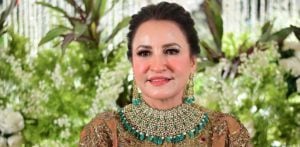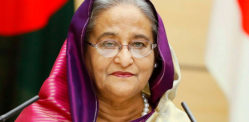“Let them announce whatever verdict they want."
Bangladesh’s deposed prime minister Sheikh Hasina has been sentenced to death in absentia for crimes against humanity.
The ruling was delivered by a Dhaka court after a deadly crackdown on a student-led uprising in 2024.
A three-judge bench of the international crimes tribunal convicted Hasina of incitement, orders to kill, and failure to stop atrocities.
The panel ruled she oversaw violent action against anti-government protesters during months of unrest.
Reading the verdict, Justice Golam Mortuza Mozumder said the “accused prime minister committed crimes against humanity by her order to use drones, helicopters and lethal weapons”.
Hasina had pleaded not guilty, claiming the tribunal was a “politically motivated charade”. The months-long trial proceeded without her.
She fled Bangladesh in August last year and remains in exile in India. The Indian government has ignored extradition requests.
Family members of killed protesters wept in court as judges confirmed death sentences for Hasina and former home minister Asaduzzaman Khan. He was the co-accused in the case.
Her empty defendant’s box was striking.
In an audio message recorded before the verdict, Hasina said:
“Let them announce whatever verdict they want. It doesn’t matter to me. Allah gave me this life and only he can end it. I will still serve my people.”
Dhaka was tense ahead of the ruling. Security forces tightened control across the capital.
Police, army and paramilitaries secured the tribunal area behind cordons. Officers issued a “shoot-on-sight” order for anyone throwing crude bombs or torching vehicles.
On November 17, a small explosive landed on a road near the court and caused panic. Police blockaded surrounding streets.
The protest movement that toppled Hasina began as a student-led action.
It escalated into a nationwide revolt known as the “July revolution”.
Hasina ruled Bangladesh for 15 years. Many citizens viewed her tenure as a reign of terror. Human rights groups and the UN documented allegations of corruption, torture and enforced disappearances.
She oversaw a brutal response to unrest. Security forces repeatedly used live rounds on civilians.
The UN human rights office estimates up to 1,400 people were killed during the uprising. It was the worst political violence since the 1971 independence war.
Her prosecution was a key pledge of the interim government led by Nobel laureate Mohammad Yunus. Protest leaders selected him last year to guide the country. They also appointed Mohammad Tajul Islam as chief prosecutor. He built the case for the tribunal in Dhaka.





























































